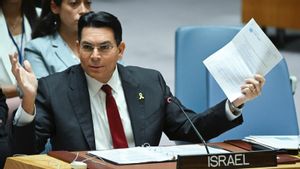JAKARTA - Commission VI of the Indonesian House of Representatives (DPR RI) criticized the government's policy of banning the sale of cigarettes in retail. According to the DPR Commission in charge of trade and Small and Medium Enterprises (SMEs), the policy does not side with the common people.
"The policy of banning the sale of cigarettes in retail does not side with the common people. Once again, micro-business actors are the victims," said Member of Commission VI of the DPR, Luluk Nur Hamidah, Wednesday, July 31.
The ban on the sale of cigarettes in retail is stated in Government Regulation (PP) Number 28 of 2024 which was recently signed by President Joko Widodo (Jokowi). The PP is a derivative regulation of Health Law Number 17 of 2023.
Luluk understands that the tightening of cigarette regulations concerns public health. But she said, this policy could have an impact on small business actors and people with low incomes.
"These cigarettes in retail are the rights of street vendors, small traders and lower-class consumers who only have the ability to buy in retail," said the legislator from Central Java Electoral District IV.
"The government should consider the needs of people with low economic conditions such as construction workers, manual laborers and other lower-class groups," said Luluk.
According to the member of the DPR who also serves in the Legislation Body (Baleg), the policy of banning the sale of cigarettes in retail will have a big impact amidst the current sluggish public consumption. Luluk assessed that the government should also consider the economic needs of the lower class in making policies.
"The ban on cigarettes in retail is truly insensitive and unfair, especially for small traders such as street vendors, hawkers, small stalls, and lower-class consumers," she said.
Luluk also highlighted how retail cigarettes actually also accommodate people who are not heavy smokers. Because they do not need to buy cigarettes in large quantities.
"If the need is to reduce the prevalence of child smokers, today what happens is that children buy illegal cigarettes without excise because the price is very cheap. This should be addressed, including systematic supervision," said Luluk.
Compared to making cigarette sales bans that have an impact on the tobacco industry, including micro-business actors, Luluk believes that the Government should focus on providing in-depth literacy on the dangers of cigarettes to children.
"I feel that the policy of banning retail cigarette sales will not be effective because if it is not fixed from the upstream, it means there is a failure in the prevention system in the fields of education and socialization," she said.
Luluk considers that the Government's new policy will actually add to new people's economic problems, the results of which are not necessarily achieved.
"I hope that the policy of banning the sale of individual cigarettes can be reviewed by the Government," concluded Luluk.
The English, Chinese, Japanese, Arabic, and French versions are automatically generated by the AI. So there may still be inaccuracies in translating, please always see Indonesian as our main language. (system supported by DigitalSiber.id)













